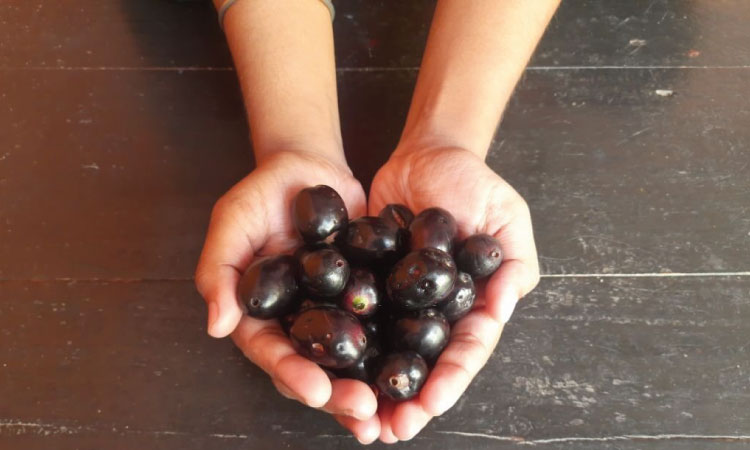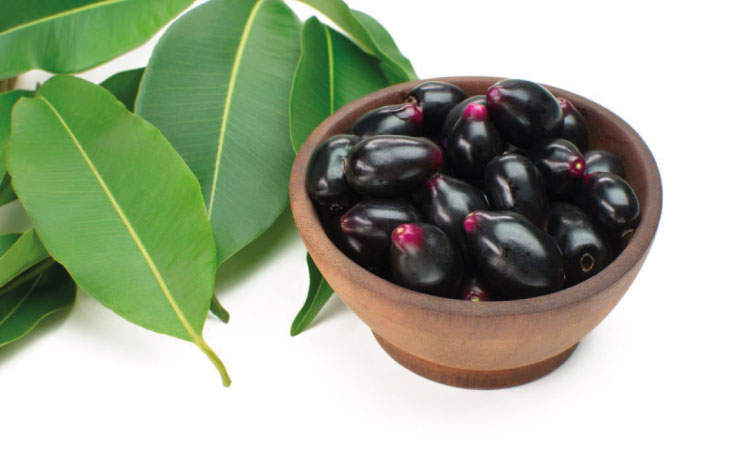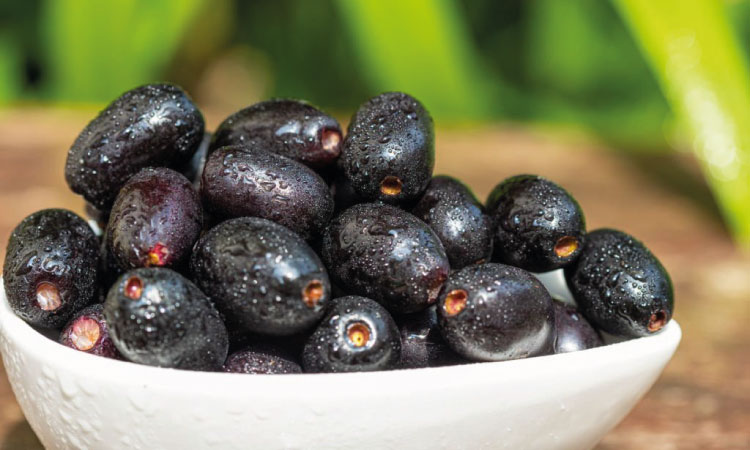“The Black Plum”, also known as Jamun, is a deliciously reviving summertime fruit. In either pureed or juiced form, Jamun has a tangy flavor that can be enhanced by adding salt and chili. It is common for pregnant women to crave Jamun. However, prior to satisfying their cravings, they may wish to determine the safety of Jamuns during pregnancy. Some rumors about eating Jamuns while pregnant include that the child’s complexion darkens and the child’s lips turn black. These are just myths. Read on to understand the benefits and side effects of Jamun during pregnancy.
Are Jamuns Safe During Pregnancy?
Yes. Jamuns contains antioxidants and nutrients that are advantageous during pregnancy.The most common argument against eating Jamun is that it can cause small stains and black patches on a baby’s body, which has no scientific basis.
To reap the benefits of Jamun in pregnancy, it is necessary to exercise moderation, as with all other fruits. It is not recommended to have more than one serving a day. It is not advised to consume Jamuns more than one serving per day. Always keep in mind that any food is delicious when eaten in healthy and normal portions rather than binge eating.

The Nutritional Profile Of Jamuns
Despite being rich in fructose and glucose, Jamun is a low-calorie fruit. A 100-gram serving of black plum carries only 60 kcal. It is an excellent source of vitamin C as well as carbohydrates, proteins, and minerals such as iron, potassium, carbohydrates, and magnesium.
According to the source, 100 grams of Jamun contains,
- 19 Mg Calcium
- 79 mg Potassium
- 15 mg Magnesium
- 14 mg Sodium
- 0.19 mg iron
- 14,4 mg of Vitamin C
In addition to that, it has a respectable quantity of vitamin B12, vitamin A, folate, and sulfur. It also contains a substantial amount of protein and fat (0.72 g and 0.23 g, respectively).
Related Reading: 15 Fruits Not To Eat During Pregnancy
Health Benefits Of Jamun During Pregnancy

Antioxidants, calcium, phosphorus, and flavonoids can all be found in high concentrations in Jamun1. Aside from folic acid and sodium, there is also thiamine, riboflavin, beta-carotene, dietary fiber, niacin, protein, and fat. As you are aware, each of these factors plays an important role in ensuring a healthy pregnancy. Let us now assess the benefits of Jamun during pregnancy:
Calculate Due Date With LMP
1. Jamun helps prevent gestational hypertension
When pregnant, high blood pressure is a risk factor for a wide range of health issues. Because of the high potassium content and antioxidants present in Jamuns, they may help to lower blood pressure. There are a few recommended natural remedies for high blood pressure during pregnancy. Pregnant women may benefit from eating Jamun on a regular basis to prevent gestational hypertension. Moreover, it prevents the hardening of the arteries2.
2. Helps prevent anemia
During pregnancy, the blood volume increases by 50 percent. Pregnant women are more susceptible to anemia because of this. If untreated, anemia in pregnancy can lead to a slew of unpleasant side effects for both mother and child.
In order to overcome iron deficiency, you should consume both iron-rich and vitamin C-rich foods. Vitamin C aids in the absorption of iron in the body. Jamuns are high in vitamin C, and they also contain iron. Thus, eating Jamun during pregnancy boosts the production of red blood cells and hemoglobin counts3.
3. Improve oral health
Pregnancy can cause dental issues, such as gum disease, bad breath, and tooth decay, in some women4. Jamun promotes oral health. It safeguards your teeth against oral infections and harmful bacteria. It helps to strengthen the teeth and gums. Jamun‘s antibacterial properties and the presence of Vitamin K aid in preventing gum bleeding.
In order to strengthen the gums and teeth, the leaves of the Jamun fruit are dried, ground, and used as tooth powder. Swishing the decoction of Jamun tree bark around the mouth is an excellent remedy for mouth ulcers.
Related Reading: 11 Healthy And Refreshing Juices During Pregnancy To Drink
4. Beneficial for pregnant women with diabetes
As per Ayurveda, Jamun aids in the control of diabetes. Jamuns are renowned for their anti-diabetic qualities5. Jamun pulps and seed coats contain higher phenolic constituents. Numerous studies have demonstrated that consuming Jamun reduces blood glucose levels6.
5. Enhances resistance to infections

Pregnant women are prone to some common infections during pregnancy. Jamun has been used for centuries as a remedy to ward off infections and fight germs7. The fruit extract’s anti-bacterial and anti-fungal properties not only get rid of germs and bacteria but also treat and heal wounds. Jamun‘s bioactive properties help the expecting women feel more energized and rejuvenated. Jamun‘s phenolic compounds have been shown to enhance the immune system during pregnancy.
6. Jamun is healthy for the heart
As a result of the additional strain that pregnancy places on the heart, it is even more important to take care of one’s cardiovascular health while carrying a child. The consumption of Jamun can help maintain a healthy heart and ward off heart-related problems. Because it contains dietary fibers as well as antioxidants, Jamun is an excellent choice for controlling cholesterol levels and preventing the formation of plaque.
7. Reduce the risk of premature delivery
Magnesium is essential for preventing preterm births, a common concern among pregnant women. Jamun has a high magnesium content. The high magnesium content of Jamun fruit helps you avoid any premature contractions and labor, thereby ensuring that the fetus can grow and develop to its full potential.
8. Contributes to pregnancy glow
Your skin will look and feel excellent after including Jamun in your daily menu because of the detoxifying and cleansing properties that it possesses. Acne flares up during pregnancy for some women. The astringent properties of Jamuns can be helpful in fighting off acne and blemishes.
Jamun is rich in vitamin C, which helps reduce the appearance of dark spots and counteract the effects of excess oil production. In addition, the antioxidants help reduce the appearance of wrinkles and fine lines. In a nutshell, eating Jamuns while pregnant is helpful for achieving what is known as the “pregnancy glow.”
9. Relieves respiratory problems
It is common knowledge that the delicious Jamun fruit can be used effectively to treat a wide variety of respiratory conditions. Common colds and the flu, which pregnant women are prone to, can all be treated with Jamun. Thanks to its anti-inflammatory and antibiotic properties8. Jamun can break up clogged mucus in the chest and nose, making it easier to breathe. Pregnant women who suffer from asthma and bronchitis can also benefit from the fruit’s anti-inflammatory properties.
10. Helps alleviate digestive problems
Due to its digestive qualities, Jamun is helpful for common gastric problems that pregnant women frequently experience. The fruit is full of vitamins A and C, which help with digestion issues and body detoxification. Bloating and flatulence, common issues that many pregnant women face at some point in time, can be alleviated by having some Jamuns. Thanks to its ability to reduce gas formation.
Jamun also facilitates nutrient absorption. Jamun is an excellent source of fiber. Common problems of pregnancy, such as constipation and hemorrhoids, can be relieved easily by eating Jamuns. Thus, eating Jamun during pregnancy’s third trimester is very beneficial.
11. Other benefits
Jamuns also have the following properties that can prove useful during pregnancy9:
- Because it is low in calories and high in fiber, Jamun is an excellent choice for pregnant women who are obese and have to maintain a healthy weight and watch what they eat
- Jamun aids in reducing fluid retention within the body, which may help to reduce edema
- Reducing urine retention is one of the benefits of Jamun fruit
- Jamun is a natural way to boost your energy and alleviate the common side effects of pregnancy such as fatigue and stress
- Diarrhea, spleen enlargement, and stomach pain can all be alleviated by eating Jamun fruit
- Aside from calcium and phosphorus, vitamin C, iron, and potassium are known to be abundant in Jamun. Therefore, it promotes bone health in the mother
- The fruit has anti-carcinogenic properties because it prevents, reverses, or delays carcinogenesis before it becomes invasive
Related Reading: Fatigue During Pregnancy
How Much Jamun Is Safe To Eat When Pregnant?

Consuming one serving of Jamun on a daily basis will help you and your baby reap all of the benefits that this food has to offer. Consuming eight to ten Jamuns per day is recommended for pregnant women in order to obtain all health benefits of Jamuns.
Side Effects And Precautions To Take While Taking Jamun During Pregnancy
Despite the fact that Jamun is safe for consumption during pregnancy, there are a few side effects that you must be aware of and some precautions you should take before consuming the fruit:
- Oxalates in Jamun fruits can cause kidney stones if you are susceptible to them
- Jamuns can irritate the throat and chest if consumed in excess
- If you are underweight and your doctor asked you to take measures to gain weight, it is better not to rely on Jamuns as this fruit fails to provide you with those extra calories
- Jamun‘s sour taste can have an acidic effect on your body, so be careful
- Never have Jamuns on an empty stomach. You can have this berry after a meal
- It is also not suggested to consume milk immediately after consuming Jamuns. You should not drink milk for at least an hour before or after you eat Jamun
- Don’t eat too many Jamuns if you have diabetes, as they can cause blood clots due to their hypoglycemic effect
- Since Jamun are typically gathered by shaking the branches, their skin and flesh are easily harmed when they fall to the ground. Don’t eat Jamuns that are broken, discolored, or old, because they are no longer safe to eat
- If the Jamuns are not fully ripe or look hard, do not buy them
- Never eat Jamuns stored in the fridge for too long
- Avoid purchasing Jamun from roadside vendors because they are tainted with lead and heavy metals
- Wash Jamuns thoroughly before eating
When To Avoid Jamun During Pregnancy?
- Avoid this black plum fruit during pregnancy if you are under-weight at any cost. The reason is simple: Even though Jamuns are packed with nutrients, they are incredibly low in calories
- Do not consume Jamun during pregnancy if it does not appear to be fresh and has not been packed appropriately
- Oxalates can be found in high concentrations in Jamun.When oxalate binds with calcium, kidney stones form. Oxalate-rich foods should be avoided during pregnancy by women who are at risk of kidney stones
Will Eating Jamuns During Pregnancy Make My Baby Dark?
There is no food that will alter the color of an unborn baby’s skin. There is no scientific evidence that eating purple Jamun during pregnancy makes the baby dark. So put that notion to rest and savor this nutritious fruit.
Conclusion

All nutrient-dense fruits and vegetables are not safe during pregnancy. Because pregnancy is such a delicate time, it’s best to check with your doctor before eating anything. It is also essential to include a wide variety of healthy fruits and vegetables in your diet during pregnancy. Jamuns belong to this category. Soak up this refreshing summer treat while remembering everything you learned here. You can satisfy cravings and stick to a healthy diet by snacking on Jamun during pregnancy.
FAQs
Just like any other fruit, even Jamun can be consumed in its raw form. Just make sure that you properly wash and clean the fruit before consuming it.
Consuming Jamun in the form of fruit juice is another easy way to have this fruit. You can also make a delicious smoothie out of it.
You can eat Jamun whenever you want. These are healthy snacks that are great for on-the-go.
No scientific evidence suggests that Jamun should be consumed at a particular time. Just refrain from consuming it on an empty stomach.
